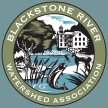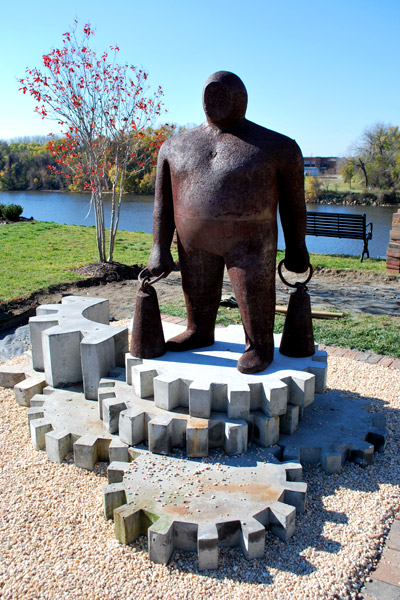|
Blackstone River Watershed Association
|
|
|
BRWA NEWS
|
Exploring the West River in Winter
January 25th provided a brief, balmy break in the frigid temperatures of
last month and 20 people made the most of it by attending the BRWA's
annual winter hike, held this year at the U.S. Army Corps of Engineers’
West Hill Dam and Park in Uxbridge. Susan Thomas, BRWA Program
Coordinator, guided the hikers on a 4.5-mile ecological trek through
hemlock, pine, and oak woodlands, along bogs and streams, through a
young grassland, and along the West River itself. Participants observed
native plants and animals while learning how the ACOE manages this
diverse and vibrant 567-acre property as a dry flood-control project
that also provides for natural resource management and public recreation.
Guide Susan Thomas and group discussing track patterns in the snow..
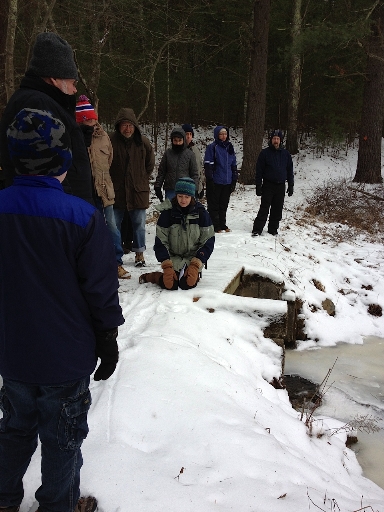
|
We stepped back in time when we walked past the stone foundation of an
old dairy barn, and when we strode along a shrubby swamp that had been
the site of an operational cranberry bog. We discussed ecological
principles, including the competitive nature of invasive plants such as
autumn olive, and the habitat requirements of species like the muskrat.
We also talked about the re-engineering of an ecological community that
transformed a simple red pine stand that had been created to absorb clay
from the dam's construction into a diverse grassland community filled
with grasses, sedges, and wildflowers. We passed people hiking, mountain
biking, birding, cross-country skiing, and dog-walking, and we learned
about Boy Scout Eagle projects and university bird research studies
being conducted on the property. We stopped to witness the beauty of a
remarkable beech tree, the dignity of a towering dead pine, and the
mystery of unidentified mammal tracks leading across a frozen stream.
The hike ended with hot cocoa and treats, and a resolve by many to
return soon to this treasure of the Blackstone River Watershed.
top
|
Annual Volunteer Water Quality Monitoring Summit
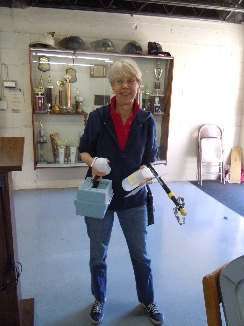 On Saturday, March 1, the Blackstone River
Coalition, along with its partners the BRWA, the Blackstone Headwaters
Coalition and the Blackstone River Watershed Council will host the
annual Watershed-wide Volunteer Water Quality Monitoring Summit. It
will be held at the Woonsocket - Harris Public Library in Woonsocket,
RI from 9:13am until noon. Susan Thomas, the BRC's Volunteer Water
Quality Monitoring Program Coordinator will present the 2013 Report
Card and discuss next steps. Additional speakers include: Therese
Beaudoin, Mass DEP Watershed Coordinator (and volunteer monitor!) who
will talk about the "Value of Volunteers to Environmental Agency
Programs", and Thomas Borden, Director of the Narragansett Bay Estuary
Program, who will give an overview of the program and how it ties
in with the Blackstone River watershed. The Summit will conclude
with Peter Coffin, BRC Coordinator, reviewing the progress of the
Campaign for a Fishable/Swimmable Blackstone River. The summit is
open to the public. The BRC is also seeking new monitors for sites
in MA and RI. For more information on the program or to RSVP for the
summit, please contact Susan Thomas at
acadia94@verizon.net or (508)839-9488.
On Saturday, March 1, the Blackstone River
Coalition, along with its partners the BRWA, the Blackstone Headwaters
Coalition and the Blackstone River Watershed Council will host the
annual Watershed-wide Volunteer Water Quality Monitoring Summit. It
will be held at the Woonsocket - Harris Public Library in Woonsocket,
RI from 9:13am until noon. Susan Thomas, the BRC's Volunteer Water
Quality Monitoring Program Coordinator will present the 2013 Report
Card and discuss next steps. Additional speakers include: Therese
Beaudoin, Mass DEP Watershed Coordinator (and volunteer monitor!) who
will talk about the "Value of Volunteers to Environmental Agency
Programs", and Thomas Borden, Director of the Narragansett Bay Estuary
Program, who will give an overview of the program and how it ties
in with the Blackstone River watershed. The Summit will conclude
with Peter Coffin, BRC Coordinator, reviewing the progress of the
Campaign for a Fishable/Swimmable Blackstone River. The summit is
open to the public. The BRC is also seeking new monitors for sites
in MA and RI. For more information on the program or to RSVP for the
summit, please contact Susan Thomas at
acadia94@verizon.net or (508)839-9488.
top
|
Watersheds and Us
One way in which the BRWA achieves its education
mission is by bringing its interactive watershed model into 5th–7th
grade classrooms throughout the watershed. Susan Thomas, BRWA Program
Coordinator, uses the hands-on model to demonstrate the interaction of
land use and water quality within our watershed. Students get to
establish residential, agricultural, commercial, and municipal
properties and then observe the effects that non-point sources of
pollution (commonly called runoff) from each of these land uses have
on our ponds, streams, wetlands, and rivers.
Grade 5 students investigating the effects of runoff and pollutants in a watershed..

|
This spring, the
Millville and Uxbridge school districts have scheduled this BRWA
program for their students, knowing that it meshes so well with
the science curriculum standards set by the state. If your school
is interested in having us present to your students, please contact us at
info@thebrwa.org.
top
|
EarthDay Cleanup 2014
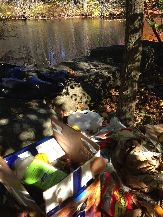 Before you know it, it will be time for the
BRWA's Annual Earth Day Cleanup and we need you to pitch in to help
make the Blackstone watershed healthier! Mark your calendars for Sunday
April 27th from 1–3 p.m. Last year, we had over 180 volunteers of all
ages on the shorelines and in the waterways removing litter, construction
debris, tires, and more. Do you know of a waterway that needs cleaning?
Please let us know at
events@thebrwa.org or call us at 508-278-5200.
You can also contact us to let us know that you'll lend a hand that day.
More details will be provided on our website as the date gets closer.
Before you know it, it will be time for the
BRWA's Annual Earth Day Cleanup and we need you to pitch in to help
make the Blackstone watershed healthier! Mark your calendars for Sunday
April 27th from 1–3 p.m. Last year, we had over 180 volunteers of all
ages on the shorelines and in the waterways removing litter, construction
debris, tires, and more. Do you know of a waterway that needs cleaning?
Please let us know at
events@thebrwa.org or call us at 508-278-5200.
You can also contact us to let us know that you'll lend a hand that day.
More details will be provided on our website as the date gets closer.
top
|
|
CALENDAR OF EVENTS
|
February is National American Heart Month.
What better way to exercise this important muscle
by strapping on some snowshoes or cross country skis and hitting the local
trails in the Blackstone River watershed?! Try out some of the following:
Uxbridge has River Bend Farm along the Blackstone Canal, and West Hill Dam
along the West River; Millbury has the Millbury Bike path along the
Blackstone River; Sutton has Waters Farm by Lake Manchaug; and Douglas has
the Southern New England Trunk Line Trail starting by Wallum Lake. Most
public golf courses allow these activities as well.
|
|
2/19
|
Blackstone River Watershed Coalition Monthly Meeting.
6:30pm - 8:30pm. Lincoln RI.
info
|
|
2/27
|
BRWA Board Meeting.
6:45 p.m. to 8:30 p.m. 271 Oak St., Uxbridge
info
|
|
3/1
|
Blackstone River Coalition's Annual Volunteer
Water Quality Monitoring Summit.
9:15am - noon. Woonsocket Public Library,
303 Clinton Street, Woonsocket, RI. Public welcome. RSVP to Susan Thomas
at acadia94@verizon.net or 508-839-9488.
See above for details.
|
|
3/2
|
"Highlights of the Blackstone River Heritage
Corridor".
Presented by Ranger Chuck Arning. 1pm - 4pm. Broad
Meadow Brook Wildlife Sanctuary. Worcester, MA.
info.
|
|
3/8
|
RI Land and Water Conservation Summit.
7:45am - 4pm. URI, Kingston, RI.
Contact: Ribert Friday at 401-932-4667 or
rfriday@rilandtrusts.org.
info
|
|
3/15
|
Blackstone Canal Conservancy Work Day.
9am. Meet at Plummers Landing west parking area,
Church Street, Northbridge. For info, contact Dave Barber 508-478-4918
|
|
3/22
|
2014 Massachusetts Land Conservation Conference:
Healthy Land - Healthy Communities.
8am - 4pm. Worcester Technical High School, Worcester, MA.
info
|
top
|
THINK GLOBAL, ACT LOCAL
|
2014 Farm Bill
President Obama recently signed into law the 2014
Farm Bill, which has been up for reauthorization since 2012. The Farm
Bill provides financial support for farmers and ensures an adequate food
supply for the public. But it also provides for the conservation of
soil, water, and wildlife on agricultural lands. This is vital since a
large percentage of privately-held lands in the United States is used for
crop production or grazing. Although overall funding for conservation
measures was reduced in the 2014 Farm Bill, it succeeds in linking
conservation practice compliance with crop insurance payments. These
practices reduce soil erosion (a leading source of non-point water
pollution), and protect wetlands. This Farm Bill also makes permanent
the conservation easement funding for wetlands and other critical habitats.
top
|
Ecological Restoration in Mass
The Massachusetts Division of Ecological
Restoration has issued its
2013 Annual Report, which details wetland and stream restoration
projects around the state. It also connects the environmental and
economic benefits of such projects at the local and state level.
For example, wetlands provide floodwater storage and filter out
contaminants from drinking water, both of which reduce the budgets of
local municipalities for such services.
Stream channel being dug for Mill River restoration project in
Taunton following the removal of Whittenton Dam.
http://millriver.blogspot.com/
MA Division of Ecological Restoration.
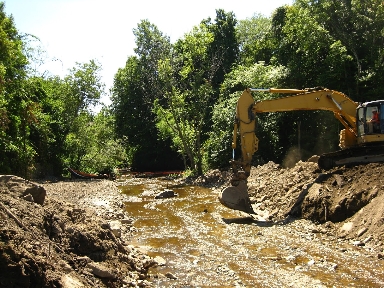
|
top
|
Mass Division of
Conservation Services Supports Mendon's Waterways
Mendon received a grant from the State's LAND
(Local Acquisitions for Natural Diversity) program to expand
conservation area protecting uplands and wetlands along Meadow Brook.
The site includes a large heron rookery.
Click here for more information on LAND grants.
top
|
EPA supports Manchaug Pond
Water Quality Improvements
Manchaug Pond..
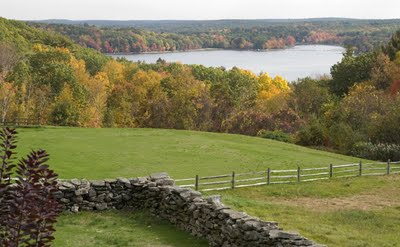
|
The EPA recently awarded a grant to the Manchaug
Pond Foundation in conjunction with support from the Mass DEP.
Restoration efforts under the Section 319 grant will focus on reducing
excess nutrient runoff into the lake as well as improving turbidity.
The grant will help the foundation and its partners establish rain gardens,
redirect stormwater entering storm drains, vegetate buffer zones, and
produce educational materials for the public. For more information on
Section 319 grants in Massachusetts, go to
http://www.mass.gov/eea/agencies/massdep/water/grants/watersheds-water-quality.html#2.
top
|
|
REFLECTIONS
|
“It is not half so important to know as to feel.” Rachel Carson
We often get caught up in our efforts to protect or improve water
quality but fail to consider the issue of water quantity. Charles
Ponticello created a cast iron sculpture entitled Deepwater Sponger,
installed along the James River in Richmond, VA. The six-foot statue
weighs one ton and represents a future human living in a time when fresh
water is so limited that mining is essential to extract it from the
earth for our consumption. The concrete gears at the base of the
Sponger include the quote "No Water, No Life."
top
|
Views & opinions expressed in linked websites do not necessarily
state or reflect those of the BRWA.
|
|
Your input is crucial to this eNewsletter. If you have a local
watershed-related story, information of interest to our subscribers, or
comments about this publication, drop an email to the editor.
The Blackstone River Watershed Association (BRWA) has a mission to
engage, educate and advocate for improved water quality in the Blackstone
River Watershed; its objectives are to:
- Engage the public in watershed stewardship activities,
- Educate members, supporters and watershed residents on watershed protection strategies, and
- Improve the water quality and esthetics of the Blackstone River Watershed’s water bodies.
The BRWA eNewsletter is published monthly by the Blackstone River Watershed
Association. BRWA is a 501(c)(3) non-profit organization.
Editor: Susan Thomas susan.thomas@thebrwa.org
Mailing address: BRWA, 271 Oak Street Uxbridge, MA 01569
Phone: 508-278-5200 Web: www.thebrwa.org
Click here for back issues.
|
|
